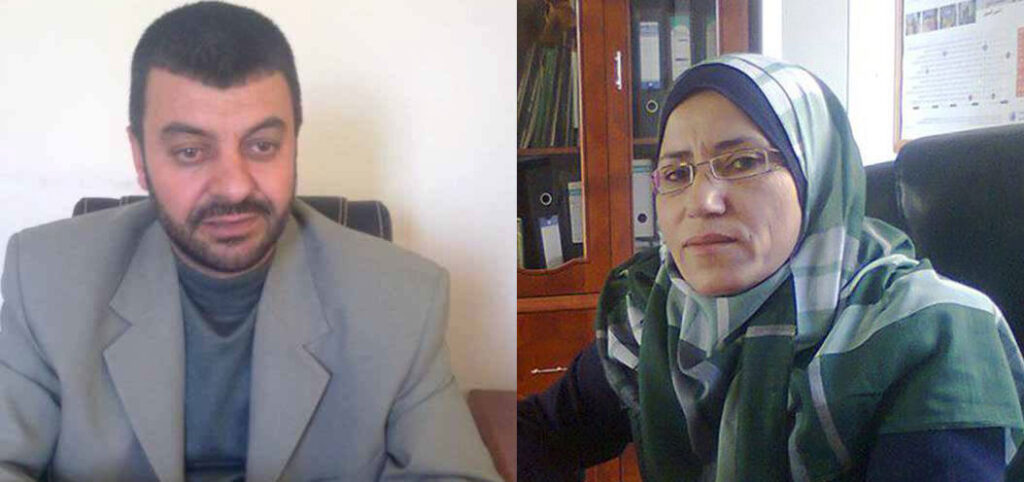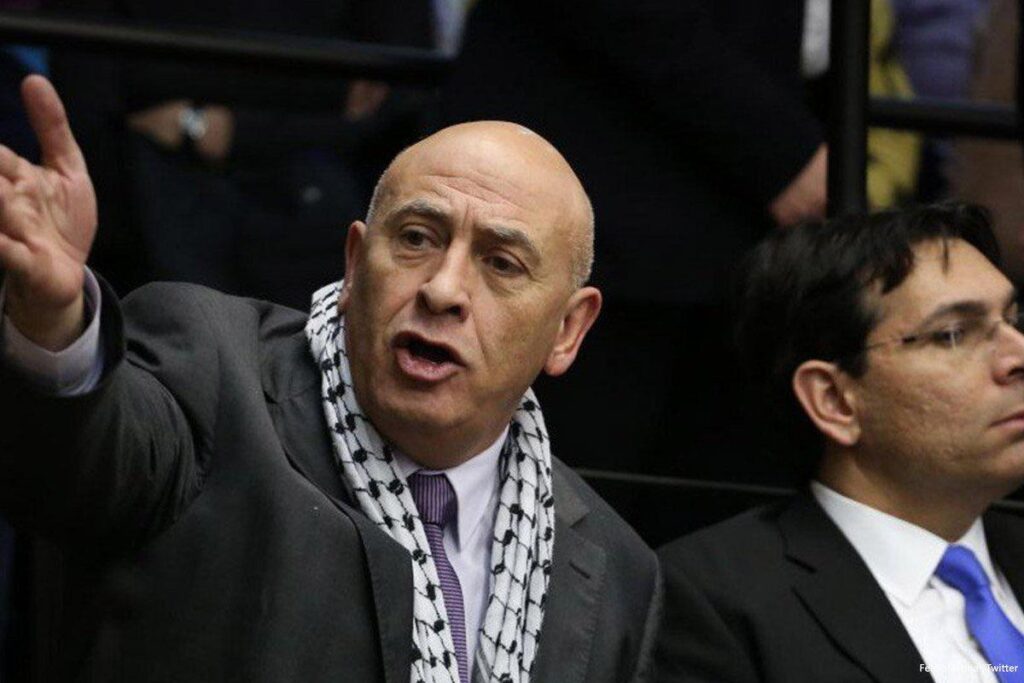 There are now 12 members of the Palestinian Legislative Council imprisoned by the Israeli occupation, following the seizure of PLC member Ibrahim Dahbour, 52, on Wednesday, 22 March at a military checkpoint near the town of Arraba southwest of Jenin. Dahbour was seized from his car and his vehicle searched and confiscated.
There are now 12 members of the Palestinian Legislative Council imprisoned by the Israeli occupation, following the seizure of PLC member Ibrahim Dahbour, 52, on Wednesday, 22 March at a military checkpoint near the town of Arraba southwest of Jenin. Dahbour was seized from his car and his vehicle searched and confiscated.
Dahbour is a member of the Change and Reform bloc, associated with Hamas in the PLC. There has been a recent escalation in the arrests of PLC members, including five arrests in the month of March 2017.
The imprisoned PLC members are:
- Ibrahim Dahbour, 52, of the Change and Reform Bloc, from Jenin, imprisoned since 22 March.
- Mohammed al-Tal, of the Change and Reform bloc, of al-Khalil. Al-Tal previously spent 11 years in Israeli prisons, half of that time in administrative detention. He was seized by Israeli occupation forces on 21 March.
- Samira Halaiqa, 53, of the Change and Reform bloc, of al-Khali. She was seized on 9 March by occupation forces who invaded and ransacked her family home. She was previously imprisoned for one year under administrative detention, imprisonment without charge or trial, in 2006, following her election to the PLC. She is now being accused in the military courts for her participation in public political events and “incitement,” for posting on Facebook.
- Khaled Tafesh, of the Change and Reform bloc, from Bethlehem. He was seized by occupation forces on 6 March. He was previously held without charge or trial under administrative detention in 2014 and was a deportee to Marj al-Zohour in southern Lebanon with other Hamas and Islamic Jihad leaders in 1993.
- Anwar Zboun, of the Change and Reform bloc, from Bethlehem. He was seized by occupation forces on 6 March, and previously spent over six years in Israeli prison, including being held in administrative detention without charge or trial in 2014.
- Hassan Yousef, 60, of the Change and Reform bloc, from Ramallah. He has been imprisoned without charge or trial since Israeli occupation forces’ raid on his home in Beitunia on 20 October 2015. He has been held on four separate occasions under administrative detention without charge or trial. He is currently held in administrative detention.
- Ahmad Mubarak, 48, of the Change and Reform bloc in Ramallah, seized by Israeli occupation forces on 16 January after they invaded and ransacked his home. He has spent over five years in Israeli prison, including five months in administrative detention in 2014. He is currently held in administrative detention.
- Azzam Salhab, 62, of the Change and Reform bloc, from al-Khalil, was seized by Israeli occupation forces on 28 November 2016. He has been detained on numerous occasions in administrative detention, and was last released from prison in July 2015. He is currently held in administrative detention.
- Mohammed Jamal Natsheh, 59, of the Change and Reform bloc from al-Khalil, has been held under administrative detention without charge or trial since 28 September 2016. He has spent over 15 years in Israeli prison and has been repeatedly ordered imprisoned without charge or trial in recent years. He was first arrested in 1988.
- Mohammed Abu Teir, 65, of the Change and Reform bloc from Jerusalem, is currently serving a 17-month prison sentence. He was seized by Iraeli occupation forces on 26 January 2016. He has spent over 30 years in Israeli prisons in total and since his election in 2006 he has been subject to multiple arrests. He was stripped of his Jerusalem ID in 2006 for participating in the PLC elections along with fellow PLC members Ahmed Attoun and Mohammed Totah and former PA Jerusalem Affairs minister Khaled Abu Arafah.
- Ahmad Sa’adat, 63, is the General Secretary of the Popular Front for the Liberation of Palestine and an elected member of the PLC on the Abu Ali Mustafa slate. Sa’adat was seized by Israeli occupation forces in a raid on the Palestinian Authority’s Jericho prison on 14 March 2006. He had been imprisoned there with his comrades under US and British guards since 2002. He is now serving a 30-year sentence in Israeli prisons after boycotting Israeli military courts, and he is a prominent Palestinian and international political leader and figure with a lengthy history of struggle and leadership in the Palestinian liberation movement.
- Marwan Barghouthi, 57, is a member of the Fateh Central Committee. He has been imprisoned since April 2002 by Israeli occupation forces and is serving five life sentences after boycotting the Israeli military courts, accused of leading the Fateh armed wing during the second Intifada. Barghouthi, like Sa’adat, is one of the most prominent Palestinian prisoners and plays a major role in Fateh and Palestinian politics from inside Israeli prisons.

 At least two Palestinian prisoners are currently engaged in a hunger strike against their detention by Israeli occupation forces without charge or trial.
At least two Palestinian prisoners are currently engaged in a hunger strike against their detention by Israeli occupation forces without charge or trial. March 30th SJP Amsterdam invite you to an event on the stuggle of Palestinian political prisoners. We are joined by speakers Charlotte Kates, international coordinator of Samidoun, and Deniz Ekram, active for Turkish and Dutch political prisoners.
March 30th SJP Amsterdam invite you to an event on the stuggle of Palestinian political prisoners. We are joined by speakers Charlotte Kates, international coordinator of Samidoun, and Deniz Ekram, active for Turkish and Dutch political prisoners.
 For Immediate Release Thursday, March 23rd, 2017
For Immediate Release Thursday, March 23rd, 2017 Leading Palestinian advocate for the boycott, divestment and sanctions (BDS) campaign for Palestinian rights, Omar Barghouti, has faced
Leading Palestinian advocate for the boycott, divestment and sanctions (BDS) campaign for Palestinian rights, Omar Barghouti, has faced  The number of imprisoned Palestinian Legislative Council members climbed to 11 on Tuesday, 21 March after a pre-dawn raid by Israeli occupation forces seized PLC member
The number of imprisoned Palestinian Legislative Council members climbed to 11 on Tuesday, 21 March after a pre-dawn raid by Israeli occupation forces seized PLC member  Israeli occupation forces
Israeli occupation forces  In yet another blow to the propaganda-driven case against Palestinian aid worker
In yet another blow to the propaganda-driven case against Palestinian aid worker  Basel Ghattas
Basel Ghattas